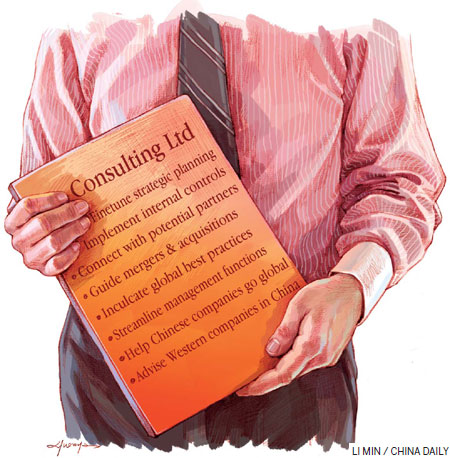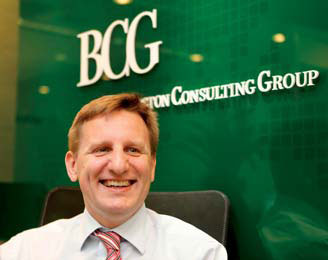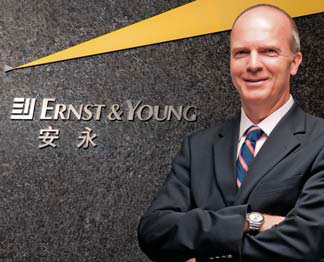Shifting sands
Updated: 2012-07-13 08:46
By Todd Balazovic (China Daily)
|
||||||||

Changing market paradigms prompt foreign consultancy firms to change tack in China
For several years large international consulting firms have helped Western companies dip their toes into the complex waters of the Chinese business market. But shifting market tides and global economic turbulence have changed all that and given rise to a host of Chinese businesses hungry to expand in the West and keen on strategies to navigate in the new business landscape.
|
Related readings: |
"More and more Chinese companies are going in for premium consultancy services, especially from international consultancies, as they need to professionalize," says Christoph Nettesheim, senior partner and managing director of the Boston Consulting Group, Greater China, the longest operating international consulting group in China.
While five to 10 years ago BCG's clients were predominantly international companies looking for ways to tap China's potential, it has now been replaced by an increasing number of domestic companies bolstering efforts to operate on global standards.
"I would not say it's a shift, I would use a slightly different word. It is an addition to the existing market," Nettesheim says, adding that international companies still account for a significant portion of the consulting clientele.
Regardless of how it is labeled, the newfound patronage has provided a beacon of hope for an industry that just three years ago suffered one of its biggest hits in more than a decade. In the UK alone consultants suffered more than a 7 percent loss in revenues and 13 percent loss of jobs in 2009, according to a report from the Management Consultancy Agency.
While the market has since stabilized, China is proving an invaluable area of expansion for most of the large consulting firms.
According to a report released by IBIS World, a business research firm, management consulting in China has enjoyed an annualized growth rate of more than 10 percent, though the premium segment enjoyed slightly higher growth rates of 15 to 20 percent, a robust performance compared with the single-digit growth in the US and Europe.
"It's the kind of growth our US colleagues would dream of," says Nigel Knight, managing partner of Ernst & Young, Greater China.
Driving the double-digit growth rates for the industry is also the government encouragement for companies to actively shore up knowledge of international business practices.
"A majority of Chinese companies are still at an early stage on the road," Zhao Qizheng, head of the Foreign Affairs Committee of the National Committee of the Chinese People's Political Consultative Conference, told reporters during the annual session of the CPPCC earlier this year. "They lack in-depth and comprehensive knowledge about overseas markets, practices and rules."
Offering global contacts, local information and knowledge of best business practices, big firms like BCG, Deloitte Touche Tohmatsu, Ernst and Young, and McKinsey are helping the biggest Chinese businesses gain in-depth insight across all industries from manufacturing to finance.
"Chinese companies need to diversify if they want to continue to grow fast. They need to internationalize and really get into strategic questions about the future - which they didn't have in the past," Nettesheim says.
"Our role is to help them understand how global leaders operate and translate that into a Chinese situation."
|
Christoph Nettesheim, senior partner and managing director of BCG, Greater China. Kuang Linhua / for China Daily |
|
Nigel Knight, managing partner of Ernst & Young, Greater China. Provided to China Daily |
Impressive strides
Many of the Chinese companies, after their domestic successes, are looking at overseas mergers and acquisitions to make use of their growing revenues.
From 2006 to 2009, annual investment into the EU by Chinese companies more than tripled from less than $1 billion (815 million euros) every year to $3 billion. From 2009 to 2011, it tripled again to $10 billion, according to the China Invests in Europe report released by Rohdium Group in June.
The trend of Chinese companies investing overseas has continued to grow this year. During the first three months of this year, overall overseas investments jumped by more than 118 percent to $21.1 billion, according to a survey by A Capital, a private equity fund with offices in Beijing, Shanghai and Paris.
Straddling an understanding of both Chinese and Western business practices, premium consultancies are helping bridge the overseas investment gap by connecting Chinese companies with potential partners.
Premium power
But it is not just companies looking to travel beyond China's borders that are joining the new flux of Chinese businesses looking to consulting firms. There have also been efforts by domestic companies to bring management practices to global standards, even if there are no plans of expanding their products internationally.
This has led to a majority of big Chinese companies flocking to premium consulting firms to adopt the most up-to-date management practices, says Norman Sze, managing partner for consulting at Deloitte China. With a client list including five of China's top banks, three top telecom companies and several major oil and gas companies, Deloitte is no stranger to working closely with China's State-owned enterprises.
Sze, a pioneer in China's consulting business who started his own company 18 years ago when the industry was just beginning, says often the biggest problem with large enterprises, State-owned or otherwise, is the method in which the companies were formed and the rapid pace at which they have grown.
"Many of the large companies started out with several subsidiaries, each one an individual company, but later consolidated together to form a group, often more like a holding company," he says.
"When that consolidation takes place, the holding companies do not inherit anything to monitor the performance of each subsidiary or business unit."
Deloitte and other big firms have mostly been tasked with the crucial role of helping China's top companies implement internal controls, reporting, financial and human resources systems. "These are the things they really need to improve on aside from the expansion and growth strategy," Sze says.
Streamlining dated management practices for private companies is also a driving force behind the increase in the number of Chinese companies seeking advice from consulting firms.
"You have many private companies where the founders now are getting to an age and a family situation where they think about succession planning and think about handing over the company to other people," Nettesheim says.
"Many of these companies need more modern management practices than if it's just a founder-led company. They need to have high-quality management that is independent from the person."
But changing the management style of a company is akin to changing the culture and while companies may hold a desire for more globalized practices, the implementation of a new management style often encounters resistance.
"Working with Chinese clients presents a different set of challenges than others," Sze from Deloitte says.
"Often domestic companies can expect us to provide global ideas and we do, but when we share it with them they realize that it is something they cannot execute."
This is why being able to understand how Chinese culture works and adapting global practices to the local culture is crucial for any sort of consulting work, he says.
Dearth of talent
The demand for well-trained Chinese consultants versed in global business practices has also created a massive gap in the talent pool for consulting firms in China.
"The biggest issue facing management consulting firms is the lack of consultants, as requirements for a consultant are very strict," says Zhao Tianle, chair of the Management Consulting Committee of China Enterprises Confederation, a non-profit organization.
"It does not only require the consultants to have specific knowledge in this field, but also possess ample work experience."
With a fairly short history - consulting in China has only been around since the 1980s, and only became an established industry in the mid 1990s - finding qualified Chinese consultants with a good grasp of Western business practices is nearly impossible.
But as the industry grows, so will the number of Chinese graduates returning from overseas studies to begin their careers at home. But until that effectively happens, the industry and the talent will be reliant on each other in China.
While the promise of engaging in the most efficient business practices is alluring, hiring a premium consultant is by no means a cheap task.
With fees ranging anywhere from 1 million yuan ($158,000, 129,000 euros) to 10 million yuan per project, hiring a top-end firm is a deep-pocketed investment for any company. Though the relative immaturity of the industry in China has allowed big firms to record healthy growth rates, it is becoming increasingly competitive.
During the early 2000s when China's potential as an economic juggernaut was first being realized, there were about 100 firms offering management consulting services. But as the interest in doing business in China flourished over the past decade, so have the number of companies offering consulting services, with 28,100 management consulting firms now operating in the Middle Kingdom, according to the IBIS World report.
"It's an intensely dynamic and competitive market," Knight says.
While most of these are medium-sized or boutique firms, unable to cope with the workload of giving a company a complete management overhaul, they offer their services for a fraction of the price. But the difference in price also reflects a difference in services.
While medium and boutique firms can satisfy the basic requirements of small businesses, larger staff and a bigger global network allow premium firms to offer a much wider skill set than most of the newer players.
"It's quite hard to be successful in China if you've just got a very simple generic set of offerings. Our client expectations have increased immeasurably in recent years - both multinational and local - and you've really got to have something different and something interesting to say to be successful," Knight says.
Though competition for domestic clients between high-end Chinese firms and international firms is fierce, premium firms like Ernst and Young have managed to maintain their advantage in the international arena.
But with multinational companies reeling from issues like the debt crisis in Europe and the slow recovery of the US economy, thereby hampering growth opportunities, China remains a bustling route for expansion.
|
Norman Sze from Deloitte China says adapting global practices to the local culture is crucial for any sort of consulting work. Provided to China Daily |
Business model
While there has been a sudden spike in the number of Chinese companies seeking to adapt and understand global business practices, foreign companies are actually pushing to do the opposite.
"A lot of foreign companies that have come to China initially came, if you like, with their overseas business model and have then found that it helped them to establish in cities like Shanghai or Beijing," Knight says.
"But when they started to try to scale and build their business, particularly when they moved out of the larger cities into the second- and third-tier cities, they found it very hard to compete with the local businesses and needed to radically change their business models."
The result is that multinationals began calling on the experienced premium consultants once again to help shift and sort a workable business model to acclimatize their companies to a more Chinese business environment.
"We're helping Chinese companies understand how they can be successful as national and international players and we're helping foreign companies understand how they can be successful in the local market - they're quite parallel," he says.
In addition to helping foreign multinationals step deeper into China's untouched markets, consultants have also been charged with the much more traditional task of increasing productivity.
With increasing pressure back home and rising service prices in China, several of China's oldest multinational companies are increasingly feeling the need to cut costs.
"Costs are increasing fast, particularly labor costs. At the same time the global economy is looking very uncertain and competition is increasing inexorably in China," Knight says.
External pressures aside, China still holds the key for companies and consultants alike. With an ever-fluctuating economic atmosphere, it is the untapped markets on both sides of the oceans providing the much-needed boost.
Acting as a bridge to the unknown, the world's top consultants are providing the know-how and strategy to help both sides succeed, Knight says.
Li Aoxue contributed to this story.
toddbalazovic@chinadaily.com.cn
(China Daily 07/13/2012 page1)

 Relief reaches isolated village
Relief reaches isolated village
 Rainfall poses new threats to quake-hit region
Rainfall poses new threats to quake-hit region
 Funerals begin for Boston bombing victims
Funerals begin for Boston bombing victims
 Quake takeaway from China's Air Force
Quake takeaway from China's Air Force
 Obama celebrates young inventors at science fair
Obama celebrates young inventors at science fair
 Earth Day marked around the world
Earth Day marked around the world
 Volunteer team helping students find sense of normalcy
Volunteer team helping students find sense of normalcy
 Ethnic groups quick to join rescue efforts
Ethnic groups quick to join rescue efforts
Most Viewed
Editor's Picks

|

|

|

|

|

|
Today's Top News
Chinese fleet drives out Japan's boats from Diaoyu
Health new priority for quake zone
Inspired by Guan, more Chinese pick up golf
Russia criticizes US reports on human rights
China, ROK criticize visits to shrine
Sino-US shared interests emphasized
China 'aims to share its dream with world'
Chinese president appoints 5 new ambassadors
US Weekly

|

|










